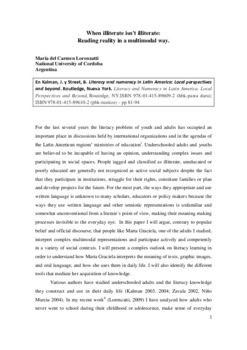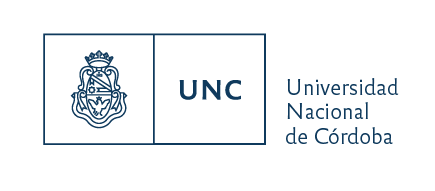| dc.contributor.author | Lorenzatti, María del Carmen | |
| dc.date.accessioned | 2021-08-05T22:17:59Z | |
| dc.date.available | 2021-08-05T22:17:59Z | |
| dc.date.issued | 2013 | |
| dc.identifier.uri | http://hdl.handle.net/11086/19334 | |
| dc.description.abstract | For the last several years the literacy problem of youth and adults has occupied an important place in discussions held by international organizations and in the agendas of the Latin American regions? ministries of education . Underschooled adults and youths are believed to be incapable of having an opinion, understanding complex issues and participating in social spaces. People tagged and classified as illiterate, uneducated or poorly educated are generally not recognized as active social subjects despite the fact that they participate in institutions, struggle for their rights, constitute families or plan and develop projects for the future. For the most part, the ways they appropriate and use written language is unknown to many scholars, educators or policy makers because the ways they use written language and other semiotic representations is unfamiliar and somewhat unconventional from a literate´s point of view, making their meaning making processes invisible to the everyday eye. In this paper I will argue, contrary to popular belief and official discourse, that people like Marta Graciela, one of the adults I studied, interpret complex multimodal representations and participate actively and competently in a variety of social contexts. I will present a complex outlook on literacy learning in order to understand how Marta Graciela interprets the meaning of texts, graphic images, and oral language, and how she uses them in daily life. I will also identify the different tools that mediate her acquisition of knowledge. Various authors have studied underschooled adults and the literacy knowledge they construct and use in their daily life (Kalman 2003, 2004; Zavala 2002, Niño Murcia 2004). In my recent work (Lorenzatti, 2009) I have analyzed how adults who never went to school during their childhood or adolescence, make sense of everyday situations using different modes of representation present in their daily life (Kress 2003). | es |
| dc.format.medium | Impreso | |
| dc.language.iso | eng | es |
| dc.rights | Attribution-NonCommercial-ShareAlike 4.0 International | * |
| dc.rights.uri | https://creativecommons.org/licenses/by-nc-sa/4.0/ | * |
| dc.subject | LITERACY | es |
| dc.subject | ADULT AND YOUNG EDUCATION | es |
| dc.subject | MULTIMODALITY | es |
| dc.title | When illiterate isn't illiterate : reading reality in a multimodal way | es |
| dc.type | bookPart | es |
| dc.description.fil | Fil: Lorenzatti, María del Carmen. Universidad Nacional de Córdoba. Facultad de Filosofía y Humanidades. Escuela de Ciencias de la Educación; Argentina. | es |
| dc.journal.referato | Con referato | |
| dc.description.field | Otras Ciencias de la Educación | |
| dc.book.city | Nueva York | |
| dc.book.country | Estados Unidos | |
| dc.book.editorial | Routledge | |
| dc.book.firstpage | 81 | |
| dc.book.lastpage | 94 | |
| dc.book.pages | 320 | |
| dc.book.role | Autor | |
| dc.book.title | Literacy and numeracy in Latin America: Local perspectives and beyond | en |





